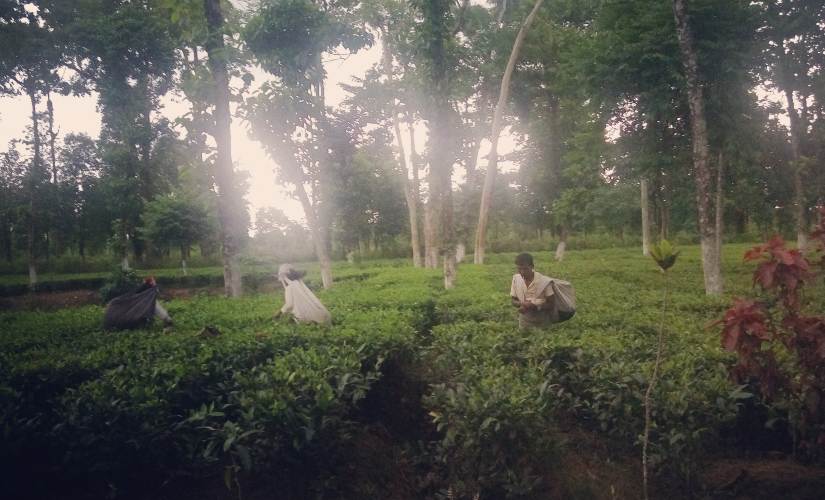Editor’s Note: In this eighteen-part series, we will attempt to address the tropes associated with the communities in question from an adivasi perspective while also exploring the contemporary relationship of adivasi citizens with the Indian government. This is the thirteenth article of the series on adivasi communities in peninsular India.
While people drink tea all over the country, few are aware of the exploitation that takes place in the tea industry. Workers on tea plantations have to contend with woefully low wages, inadequate implementation of the Plantation Labour Act, gross violation of the Provident Fund Act and an overall lack of agency in their work. These workers are mostly adivasis living in West Bengal and Assam. The worst-affected are families who bear the brunt of tea estates being shut down.
India is the world’s largest consumer and second-largest producer of tea. In the year 2017, 1,322 million kilograms of tea was produced in the country, which accounts for 23 percent of the total tea produced in the world. Although the tea industry generates a significant amount of revenue, labourers live in abject poverty, and are often neglected by the Central and state governments.
Historical context
Tea plantations in India have their roots in colonialism. They originated as a result of the failure of the East India Company in convincing the Chinese government to grant rights of monopoly trade in 1833. Assam and north Bengal in colonial India were suitable for tea cultivation because of the climate and availability of land. Earlier, in 1823, wild varieties of tea had been found in Assam.
[caption id=“attachment_7331141” align=“alignnone” width=“825”]  Tea garden workers at work. The workers start their work immediately after sunrise. Christopher Binay Nag[/caption]
Thus, Assam and north Bengal were among the first parts of colonial India to have been penetrated by large-scale capitalist plantation agriculture from the middle of the 19th Century.
Impact Shorts
More ShortsHowever, at that time, the local people were not willing to work on plantations. Thus, large-scale migration of adivasis from the Chhota Nagpur plateau region to these plantations was engineered by the British. Families were made to work on the plantations either through the use of force or through fraud.
Planters argued that the adivasis of Chhota Nagpur were best suited for the physical work in the plantations, as they easily adapted to the climate of Assam and north Bengal and were hard working. However, the preference for adivasis from Chhota Nagpur over the local population was more about the preference for immigrant labour over local labour.
This is because generally, the local population enjoys a significant control over resources of agriculture, forest land and its own labour, while immigrants are simply at the mercy of the plantation owners. They do not have either legal or traditional rights over the local resources and thus, are left with no option but to obey the owner of their labour power.
In the tea-growing regions, the relationship between the plantation workers and employers (managers and owners) resembled that of a servant and master. The plantation workers were like slaves; they were not allowed to leave the area at will, and all absconders were treated as criminals.
It has been 158 years since the first tea garden was set up in Dooars (a region comprising present-day north Bengal and parts of Assam.) It has been 71 years since the country attained Independence. Yet, little has changed for tea garden workers, and, in a sense, they are yet to taste real freedom.
Neglect of Plantation Labour Act, 1951
The wages of the tea garden workers in West Bengal are presently lower than the MGNREGA wage rate. The current wages of a tea garden worker in Dooars, West Bengal are Rs 176 per day, whereas the MGNREGA wage rate is Rs 191 per day. Employers justify the sub-human wage rate with the claim that the wages of tea garden workers comprise two components: cash and kind. According to the Plantation Labour Act (PLA), 1951, tea garden workers are entitled to subsidised ration for their spouse and two dependent children, as also housing facilities, education for children, cooking fuel, safe drinking water, health care facilities, crèches, transport etc. But the implementation of the PLA has been inadequate.
[caption id=“attachment_7331161” align=“alignnone” width=“825”]  The Rangamati Tea Gardens.Christopher Binay Nag[/caption]
“The managers and owners of tea gardens have been looting the workers,” alleges Roshan Lakra, an adivasi youth from the Chalouni tea garden. “The facilities mentioned in the Act constitute our statutory right, but the government has till date never ensured that we get them.”
Suraj Oraon, who also lives in the same tea garden, adds, “In Assam and West Bengal, tea garden workers do not get the benefit of the Minimum Wages Act. The wage here is not up to the industry standards. It is not even enough for a family to survive.”
The daily wages of tea garden workers in the southern states are much more than in Bengal and Assam. This is indicative of the lack of political will on the part of managements, owners and the State.
Also, payment of wages and rations are often delayed. In the tea gardens in Dooars, timely payment of wages is still a distant dream. In most tea gardens, wages are paid after one or two weeks, and a delay of a month in providing for a week’s ration is quite common. In many tea gardens, workers have not received ration at a stretch for 24 to 52 weeks.
In a study conducted by Anuradha Talwar in 2005 on 22 tea gardens, it was found that each of the 22 tea gardens had a huge wage liability towards the workers. Low and delayed payment of wages was common in all the 22 tea gardens and there were also some cases of non-payment. Some of the tea gardens paid full wages to the workers only during the peak season (plucking season). In the same study, the financial details of 18 tea gardens were collected, in which it was found that the total wages due to the workers amounted to Rs 175,194,059.62 and the total liability towards the workers in the 18 tea gardens was found to be Rs 366, 243, 653.5. Talwar argued in the study that the amount stated is an underestimate as the default in overtime, maternity benefits have not been taken into account.
[caption id=“attachment_7331191” align=“alignnone” width=“825”]  Children play by the river side inside a tea garden. Christopher Binay Nag[/caption]
Lack of surveillance and monitoring has made violations of the statutory provisions of the Plantation Labour Act, 1951 rampant. According to a survey by West Bengal’s labour department, of all the 273 tea estates of West Bengal, only 166 have hospitals. Out of these, only 56 tea estates have full-time residential doctors and only 74 doctors have MBBS degrees. When a worker does not receive ration and other non-cash statutory rights on time, it literally creates a situation of starvation for the family. The problem becomes acute when the garden closes down, especially if there is only one earning member in the family.
Workers denied provident fund (PF)
In most tea gardens, workers do not receive PF receipts from the employer, and thus do not have any knowledge about their pension fund. Workers also do not get proper and timely ration and on retirement, they have to struggle to get what they are entitled to.
Violation of the Employees’ Provident Funds and Miscellaneous Provisions Act, 1952 is common in the tea gardens of Assam and West Bengal. In Assam, 227 tea gardens have defaulted in depositing provident funds amounting to about Rs 100 crore. The Telegraph reported that more than 50 tea gardens have failed to deposit the employers’ and workers’ share of provident fund. The amount of default in tea gardens under the Siliguri sub-regional office of the Provident Fund authority is around Rs 100 crore.
It is the statutory duty of the Provident Fund Commissioner to monitor and regulate the implementation of the Act. In cases of violations, the Commissioner has the power to collect evidence, and attach the violator’s bank accounts and personal properties. The PF Commissioner has the authority to lodge a criminal case against the defaulting employer.
It is impossible that violation of the Act at such a huge scale has gone unnoticed by the Provident Fund Commissioner. Despite such large-scale defaults, the state government authorities have failed to secure the rights of the tea garden workers, who are mostly adivasis.
Role of unions
In the tea gardens in West Bengal and Assam, multiple trade unions affiliated with CITU, INTUC, TMC, and ABVP have been functioning. One of the primary purposes of unions is to ensure that the rights of the workers are upheld and that the management does not exploit workers. It is surprising that despite the presence of multiple unions, wages are abysmally low. While the State and the tea-producing companies have failed to uphold the fundamental right to life of workers, trade unions have mostly been silent spectators. This puts a serious question mark on the unions and their leadership.
The leadership of the unions at the district, state and national level comprises mostly of savarna men, and the leadership does not consist of tea garden workers themselves. Thus, even when the unions advocate for the rights of the workers, they tend to give up too soon, without the demands being met. Workers are not given space in the decision-making processes. Through this, adivasi and women tea garden workers are further marginalised.


)

)
)
)
)
)
)
)
)



